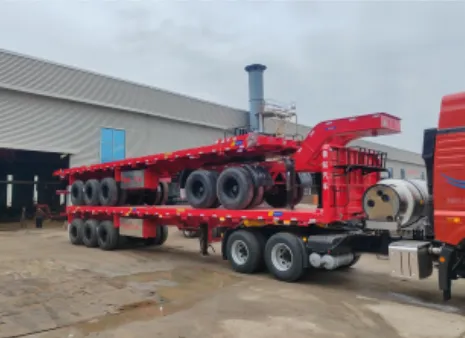road roller machine
The Road Roller Machine An Essential Tool in Construction
The road roller machine, often referred to simply as a roller, is a vital piece of machinery in the construction and civil engineering sectors. Its primary function is to compact soil, gravel, asphalt, and concrete, creating a smooth and durable surface for roads, highways, and other infrastructure projects. Understanding the design, types, uses, and operational intricacies of road rollers provides valuable insight into their significant role in modern construction practices.
Design and Types of Road Rollers
Road rollers come in various shapes and sizes, each designed for specific types of tasks. The most commonly used types include
1. Single Drum Rollers Featuring a large drum in the front and rear wheels that are either smooth or have patterns, these rollers are primarily used for compacting asphalt and gravel. They can efficiently maneuver through tight spaces, making them suitable for urban projects.
2. Double Drum Rollers Equipped with two smooth drums, one at the front and one at the rear, double drum rollers are excellent for compacting asphalt surfaces. They provide uniform pressure and are commonly used on roads and parking lots.
3. Tandem Rollers These machines also feature two drums, but their operation is slightly different. They are generally more compact and ideal for small to medium-sized projects, such as patchwork and parking lots.
4. Pneumatic Rollers Instead of drums, these rollers have air-filled tires and are particularly useful for compacting materials that need to be sealed, such as asphalt. The flexibility of the tires allows for better contouring over uneven surfaces, delivering a smooth finish.
5. Rubber-Tired Rollers Similar to pneumatic rollers, rubber-tired rollers can navigate rocky or grassy terrains better while providing impressive compaction abilities. They are mainly used in road construction to compact both soil and asphalt.
Operational Mechanisms
road roller machine

The effectiveness of a road roller machine lies not just in its physical design but also in its operational mechanisms. Road rollers typically operate using a combination of weight, vibration, and oscillation. The weight of the roller exerts downward force on the material, compaction it through sheer pressure. Moreover, many modern rollers are equipped with vibratory mechanisms that enhance their ability to achieve higher density in materials, resulting in increased stability and longer-lasting surfaces.
The Importance of Road Rollers in Construction
The use of road roller machines is essential in the construction industry for several reasons
1. Surface Durability Proper compaction of soils and asphalt prevents surface degradation and extends the longevity of roads. A well-constructed road minimizes maintenance costs and effectively distributes the weight of vehicles, reducing the risk of pavement failure.
2. Cost Efficiency Investing in a quality road roller can lead to significant savings in construction processes. Efficient compaction allows for a faster workflow and reduces the need for frequent repairs and rework.
3. Safety A solid and well-compact surface ensures the safety of vehicles and pedestrians. Poorly compacted surfaces are prone to cracking and potholes, which can lead to accidents.
4. Environmental Impacts Compaction helps in adhering to environmental regulations as it stabilizes surfaces, preventing soil erosion and controlling dust emissions during construction processes.
Conclusion
In summary, the road roller machine plays a formidable role in the construction industry, ensuring that roads and other surfaces are durable, safe, and cost-effective. With advancements in technology, modern rollers are becoming increasingly sophisticated, incorporating features that enhance their performance and efficiency. As urban infrastructure continues to evolve, the demand for reliable road rollers remains high, reflecting their indispensable role in shaping the foundations of our modern society. Understanding the intricacies of these machines allows stakeholders in the construction industry to make informed decisions, ultimately leading to better construction practices and outcomes.
-
SINOTRUK HOWO 84 Electric Dump Truck for Eco-Friendly Heavy HaulingNewsJul.26,2025
-
The Fast 16-Gear Manual Transmission Assembly for Heavy TrucksNewsJul.25,2025
-
Mercedes Benz Actros 1848 42 Tractor Truck for Sale - Reliable PerformanceNewsJul.24,2025
-
High-Quality Water Pump Assembly for Sinotruk Trucks – Durable & ReliableNewsJul.23,2025
-
Premium Truck Engine Antifreeze Coolant Fluid for Heavy Duty VehiclesNewsJul.22,2025
-
FOTON View G7 Mini Bus: Affordable & Spacious TransportNewsJul.22,2025
Popular products

























